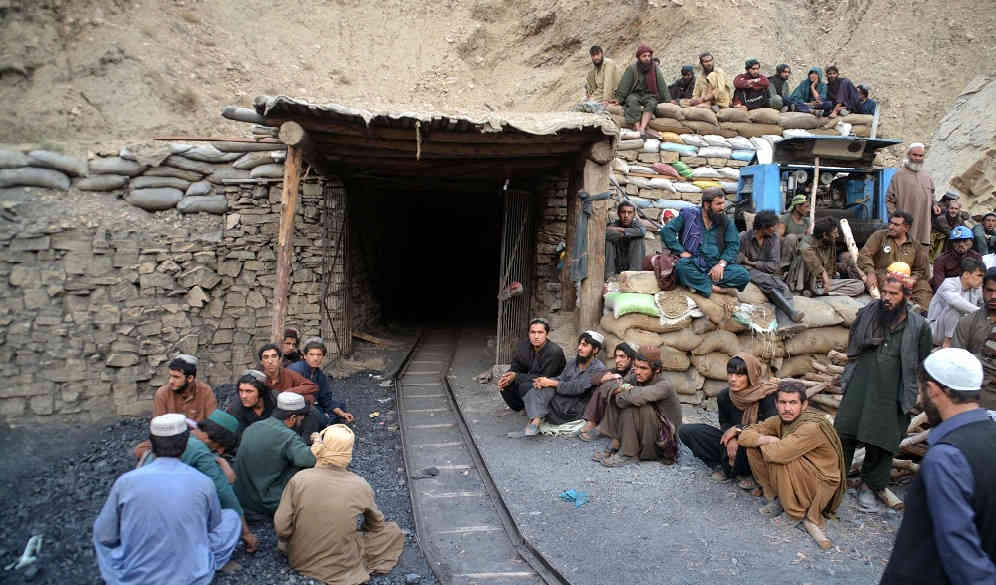

The coal miners in Balochistan (Photo: IANS)
<p>
One of the most neglected areas in South Asia – Balochistan, is facing another tragedy – food insecurity. The UN says that five lakh people are facing a crisis of food insecurity while another 100,000 people need &quot;immediate life-saving assistance due to severe drought-like conditions&quot;.<br />
<br />
On Tuesday, the <a href="https://www.unocha.org/story/daily-noon-briefing-highlights-pakistan">UN Office for the Coordination of Humanitarian Affairs</a> (OCHA) said: &quot;The dry spell and reduced water availability have destroyed crops and threaten livestock survival. Balochistan is also still reeling from the effects of multiple recent disasters, including a harsh winter, a locust infestation and the COVID-19 pandemic&quot;.<br />
<br />
Balochistan is the largest province in Pakistan, occupying almost 40 per cent of its landmass with little population. The province, however, suffers from poverty, low human development indicators, economic exploitation as well as conflict. Strategically located, it borders Iran and Afghanistan while providing Pakistan a sea-face towards the Arabian Sea.<br />
<br />
Geo-political analyst Mark Kinra told <em>India Narrative</em>: &quot;Balochistan has arid to semi-arid climatic conditions where 72 per cent of the population lives in rural areas and is heavily dependent on agriculture. With 71 per cent of the population living in multidimensional poverty, harsh winter, locust invasion, covid and draught will further worsen the situation for an already deprived community&quot;.&nbsp;&nbsp;</p>
<p>
The Baloch people are not just fighting harsh climatic conditions. The resource-rich province is also being exploited by Pakistan along with China through a flurry of high-profile projects. Rich in mineral deposits, both China and Pakistan have been mining the Baloch land for gold, copper, iron and coal.<br />
<br />
The local people, however, do not benefit from this exploitation of the natural resources as Islamabad and Beijing siphon it off.</p>
<p>
<strong>Read More: <a href="https://www.indianarrative.com/world-news/baloch-generations-suffer-deadly-diseases-left-behind-by-pakistan-s-nuclear-blasts-91542.html">Baloch generations suffer deadly diseases left behind by Pakistan&#39;s nuclear blasts</a></strong></p>
<p>
<strong>Read More: <a href="https://www.indianarrative.com/world-news/pakistan-air-force-to-build-new-air-base-in-balochistan-85865.html">Pakistan Air Force to build new air base in Balochistan</a></strong></p>
<p>
The other important joint project that has taken away the livelihoods of the Baloch is the Gwadar port. The strategically-located commercial and naval base has caused the displacement and disruption of tens of thousands of Baloch fishermen. Despite giving away their lands and also the coastline, the Baloch have not been adequately compensated. The fishermen have been protesting against both China and Pakistan for the loss of livelihood from the sea.</p>
<p>
Kinra highlights that Gwadar, which is the hub for Chinese activity and is projected as the golden apple of China-Pakistan Economic Corridor&#39;s (CPEC) is facing water scarcity at extreme levels. &quot;Recently Gwadar witnessed violent protests due to shortage of water and electricity. People are forced to call water tankers which costs about Rs 10,000 a month – more than the average salary of the local people&quot;.<br />
<br />
He adds that currently, Gwadar requires 7.5 MGD of water of which Gwadar city manages to get only 1.5 MGD from the Akra Kaur Dam. &quot;Though the China Overseas Ports Holding Co., has installed a reverse osmosis desalination plant which provides 1 MGD water, it is used within the Gwadar free zone itself&quot;.<br />
<br />
The resource-rich province has fallen off the development charts not just because of its harsh terrain and climate but also because of the exploitative policies of the Pakistan government. With China joining the fray in exploiting the Baloch, livelihoods, food and water have become even more scarce.<br />
<br />
The UN has launched livelihood projects with partners but due to low-levels of funding and uncertain weather conditions, the region will continue to remain affected. It has shared a grim weather forecast and has predicted that drought-like conditions will continue.<br />
<br />
&quot;Low rainfall during October 2020 to May 2021 has created severe drought-like conditions in parts of Balochistan province with six of the 12 central and southern districts being severely affected. It is forecasted that drought-like conditions will continue in the affected districts until the end of the year&quot;, says the UN.&nbsp;&nbsp;</p>
<p>
<strong>Read More: <a href="https://www.indianarrative.com/world-news/facing-conflict-and-covid-afghan-refugees-flee-to-neighbouring-countries-some-falling-in-the-trap-of-terror-groups-101821.html">Facing conflict and Covid, Afghan refugees flee to neighbouring countries, some falling in the trap of terror groups</a></strong></p>
<p>
<strong>Read More: <a href="https://www.indianarrative.com/world-news/chinese-fishing-trawlers-swamp-arabian-sea-baloch-fishermen-protest-97438.html">Chinese fishing trawlers swamp Arabian Sea, Baloch fishermen protest</a></strong></p>
The Index of Industrial Production (IIP) growth rate for the month of November 2024 is…
About sixty per cent of global manufacturers will use generative AI as a tool to…
International students from leading American universities held an interaction with External Affairs Minister Dr S…
India's pivotal involvement in the liberation of what was formerly East Pakistan occurred over four…
India on Friday sent humanitarian assistance to Cuba following the devastation caused by Hurricane Rafael.…
External Affairs Minister S Jaishankar emphasised India's commitment to women-led development, integrating it into the…